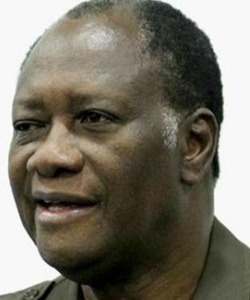 You may be seated at home enjoying a cup of coffee or cocoa while watching a movie or having a good time with friends but you don't know half the problems the people where what you are drinking comes from are going through. Ivory Coast one of the leading producers of cocoa and coffee may be the source of your beverage. It's also the fourth largest exporter of goods in Sub Saharan Africa following South Africa, Nigeria and Angola.
You may be seated at home enjoying a cup of coffee or cocoa while watching a movie or having a good time with friends but you don't know half the problems the people where what you are drinking comes from are going through. Ivory Coast one of the leading producers of cocoa and coffee may be the source of your beverage. It's also the fourth largest exporter of goods in Sub Saharan Africa following South Africa, Nigeria and Angola.
Ivory Coast or Cote d'Ivoire as commonly known in French, has had its fair share of poor leadership. For instance, in the 1999 coup, their leader Bedie who had excluded many potential opponents from the army was overthrown by the group of dissatisfied soldiers putting General Robert Guei in power. The new leadership reduced corruption and crime and stood for a more open campaign environment.
In 2000, the nation had elections, Guei vied with Laurent Gbagbo after another potential candidate Alassane Ouattara had been disqualified by the country's Supreme court due to allegations of being a Burkinabe (from Burkina Faso) as the constitution didn't allow for non-citizens to run for presidency. Although the elections were generally reported to be peaceful, there was army and civil unrest to the lead of the elections following a public uprising leading to the death of 180 people. Guei lost and handed over power swiftly to Laurent Gbagbo.
In September 2002 the president, Gbagbo visited Italy, armed rebels capitalized on his absenteeism to stage a coup launching attacks in several cities and trying to demobilize the troops in the main barracks in Abidjan taking control of the north part of the country. French troops were deployed in the name of protecting their citizens in the streets of Abidjan to stop the advancements of the rebels. Whether the French troops aided in worsening or stopping the situation is still not known because each group, rebels and the army, were accussing them of aiding the colliding with the opposite group. It was alleged that former president Guei had plotted the coup attempt, his dead body was aired on national television on the streets of Abidjan where he and fifteen others were murdered in his home and his body taken to the streets to incriminate him. Alassane Outtara took refuge in the French embassy, his house was torched. On his return from Italy, the president on national television stated that some of the rebels were hiding in the city shanties where foreign workers were staying which led to numerous attacks, demolition and burning down of houses in the shanty areas.
In January 2003, Gbagbo signed and accord with rebel leaders creating a government of national unity, although it was unstable with neither of the sides achieving its goals due to mistrust. The rebels failed to disarm and in 2004 the unity government collapsed and Laurent Gbagbo ordered airstrikes against them killing a lot of people including French soldiers caught in the crossfire.
Although gbagbo's original mandate had expired on October 30th 2005, due to lack of disarmament it was declared unsafe to hold elections, this led to his term being extended for one year according to a plan worked out by the African Union. In 2006 another one year extension was endorsed by the United Nations Security Council as the environment still wasn't safe. A peace accord was signed by the government and the rebels, New Forces, with Guillaime Soro their leader being made the Prime Minister.
The elections that were to be organized in 2005 were postponed to 2010. The Electrol Commission of Cote d'Ivoire declared Alassane Ouattara the winner results which were disputed by the ruling party and the Constitution Council which had the final say on the outcome of the outcome of the elections. The head of the Constitution Council invalidated 500,000 votes from pro-Ouattara region and declaring Gbagbo the winner. The army closed the border and foreign news organizations were banned from broadcasting from within Cote d'Ivoire. Although Gbagbo was sworn in Ouattara too took the presidential oath with the African Union, United Nations, France, United States, European Union and ECOWAS recognizing Ouattara as the president.
These leadership wrangles due to 2010 elections has had severe economical, agricultural, educational and health effects in country:
a. In the western part of the country the education and health sectors have been greatly affected with close to 90% of qualified medical practitioners and teachers not reporting to work.
b. Serious health crisis has been raised due to shortage of medicine and the absence of disease surveillance.
c. Also in the western part 180,000 children have not yet resumed to school since the crisis broke out and throughout the country some 800,000 children are still missing out of school.
d. Over 41,000 people have been displaced majority of whom are women and children raising fears to food security.
e. Next season's crops and seeds have been consumed raising concerns of the next harvest being poor.
By Oscar Otindo,
The writer is a Kenyan volunteer and activist based in Nairobi, Kenya.
